Source: The Conversation (Au and NZ) – By Caitlin West, PhD Candidate in Drama and Theatre Studies, The University of Queensland
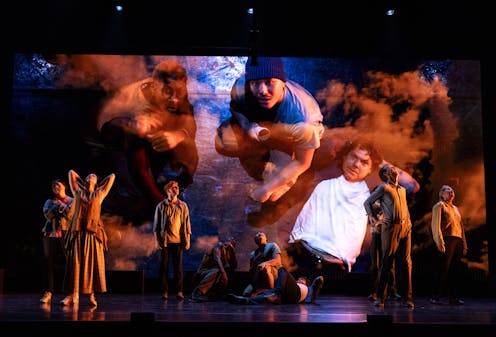
Unapologetically sentimental, uncynically joyful, and brimming with wholeheartedness, Love Stories delivers exactly what its title promises.
Adapted by Tim McGarry from Trent Dalton’s 2021 book and directed by Sam Strong, this production is an uplifting celebration of love in all its forms.
Sitting on a street corner in Brisbane with a typewriter, an author (identified as “Husband” in the program) solicits love stories from passers-by. An exuberant and kaleidoscopic series of vignettes follows, based on (and some recounted verbatim from) stories told by real people.
A man proposes to his girlfriend via flash mob; grandparents describe their love for their grandchildren; a woman reconnects with her heroin-addicted mother; a widow grieves the loss of her husband. Interwoven through these narratives is the Husband’s own love story with his wife.
Inspired by the real-life marriage of Dalton and Fiona Franzmann, this story explores the underbelly of work, pain and hard-earned joy that sits beneath a seemingly perfect relationship.
Powerfully moving
Two hours of love stories could easily become emotionally repetitive or stale. However, McGarry, Dalton, Franzmann and Strong have deftly crafted a narrative arc that balances light and shade, joy and sorrow, renewal and loss.
The vignettes are, without exception, engaging, heartwarming, funny and, at times, powerfully moving. Although varied, they are held together by the spinal narrative thread of Husband and Wife.
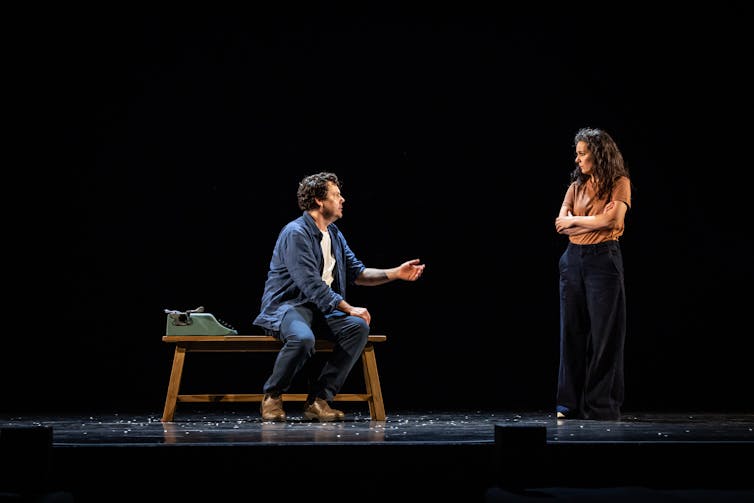
David Kelly/QPAC/Brisbane Festival
Jason Klarwein and Michala Banas shine in their portrayals of Husband and Wife, bringing a down-to-earth warmth and relatability to their depiction of a loving marriage under strain. They are supported by a strong ensemble, who move seamlessly between characters and storylines, often with impressive clarity. Bryan Probets’ and Jeanette Cronin’s playful and at times hilarious transformations are particularly enjoyable.
Throughout the production, on-stage cameras capture and project footage of the actors onto a screen at the back of the stage. Craig Wilkinson’s video design and Tnee Dyer’s camera work are tightly choreographed and often strikingly beautiful.
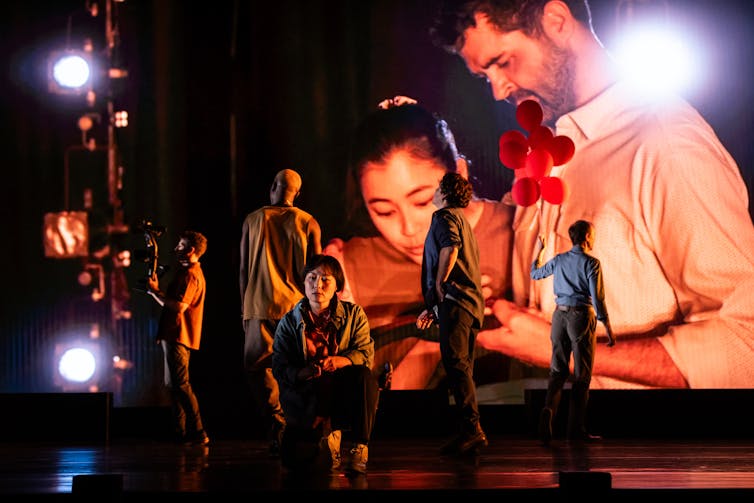
David Kelly/QPAC/Brisbane Festival
The projections are at their best in the moments of cinematic intimacy, when close-ups of characters’ faces allow the audience to see every nuance of their pain and joy.
Occasionally, the simultaneous on-stage action and video feed becomes overwhelming, with the two elements distracting from rather than supporting each other. For the most part, however, the camera work adds intimacy and texture to the drama.
Joyful and explosive celebration of love
This production, according to Dalton’s program note, aims not only to celebrate love, but also to ask the deeper question: what is love?
Many of its stories suggest answers, as well as raising their own questions. Is it more loving to hold onto someone or let them go? Where is the line between worthwhile effort and unreasonable sacrifice?
While these are rich and important questions, they are not always given space to settle and expand. The sheer number of stories packed into this nearly two-hour production means the action is at times almost frenetically busy. The pace is engaging and exciting – but leaves little time for deeper explorations of each story’s questions and themes.
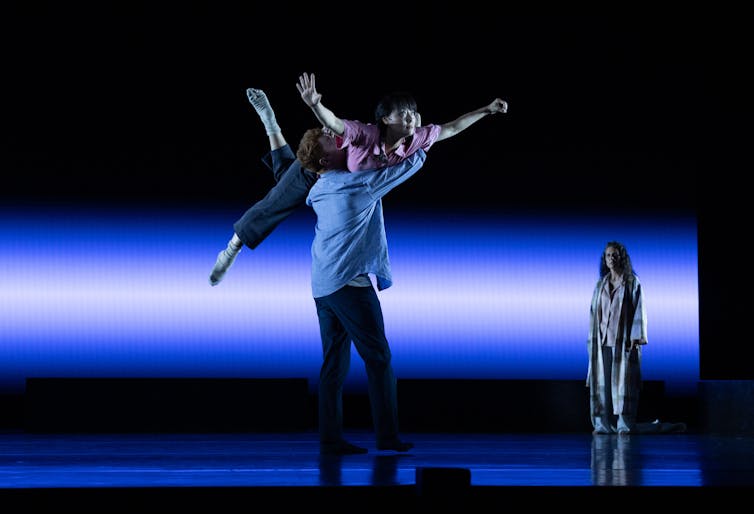
David Kelly/QPAC/Brisbane Festival
This production may not always reach the philosophical depths it seems sometimes to aim at, but this does not detract from the joyful and explosive celebration of love that is its greatest achievement.
Some of the play’s most powerful moments are generated the moments when the production leans into a well-earned stillness and thoughtfulness.
A stunning monologue on the continuity of love across thousands of First Nations generations is performed beautifully by Mathew Cooper. An ordinary conversation between Husband and Wife reveals how a seed of discord can be sown while you’re brushing your teeth for bed. The story of Sakura Tomii, performed movingly by Kimie Tsukakoshi, reveals the depths of pain that can live behind a cheerful smile from a stranger.
Love Stories is peppered with quotations and expressions of love. “Love is all there is,” quotes a passing poet. “Love is the answer to every question”, Wife tells her Husband. “I love you”, signs a young girl to her boyfriend across a busy street.
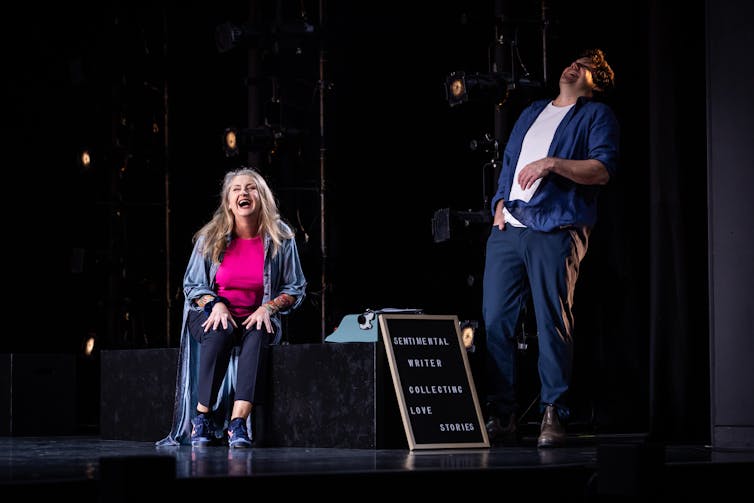
David Kelly/QPAC/Brisbane Festival
In the final moments, the character Jean-Benoit – a busker who has acted as a chorus of sorts, played engagingly by Rashidi Edward – invites the audience to go out into the world and love one another. There is no subtlety here: love more, love better and love deeply is the resounding battle cry of this production.
A cynic might raise an eyebrow, but who wants to be a cynic? More than anything else, Love Stories is an expression of hope. Love does exist: people live, strive and make sacrifices for one another every day.
It is an undeniably important reminder, and it is delivered with joy, energy, humour, passion and beauty.
Love Stories is playing at QPAC for Brisbane Festival until September 29.
![]()
Caitlin West does not work for, consult, own shares in or receive funding from any company or organisation that would benefit from this article, and has disclosed no relevant affiliations beyond their academic appointment.
– ref. A new play brings Trent Dalton’s Love Stories to the stage in a joyful and exuberant celebration of love – https://theconversation.com/a-new-play-brings-trent-daltons-love-stories-to-the-stage-in-a-joyful-and-exuberant-celebration-of-love-235663




